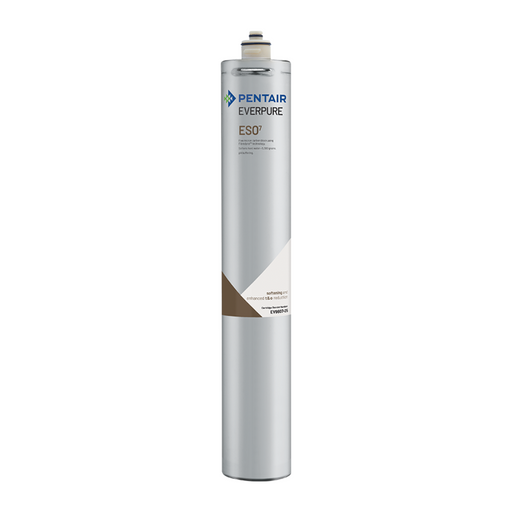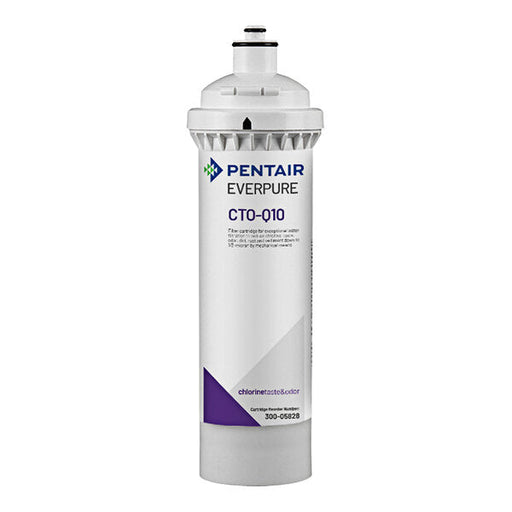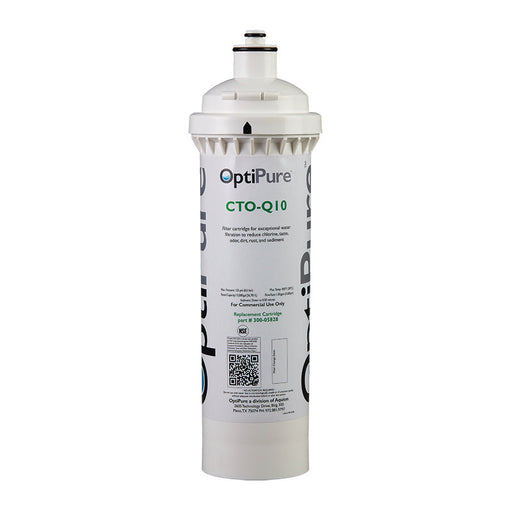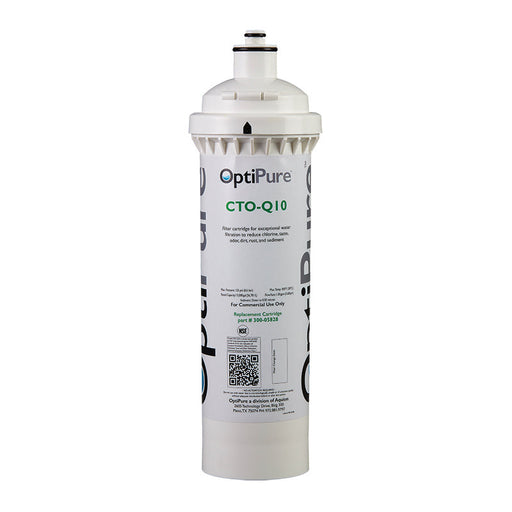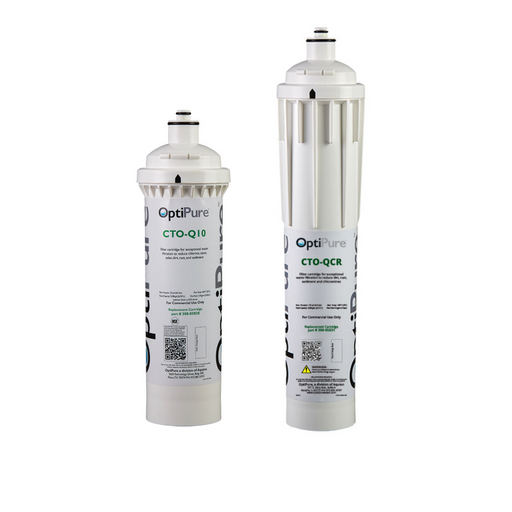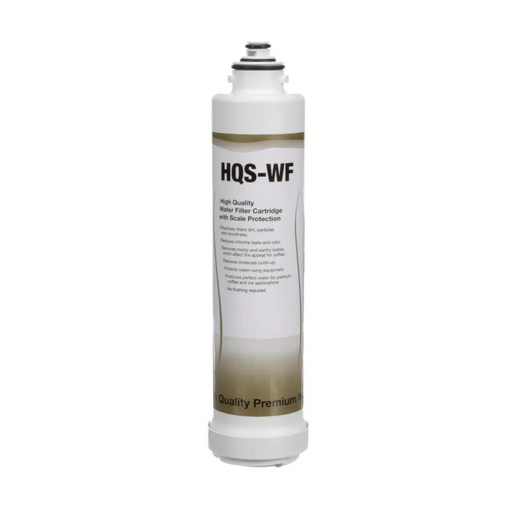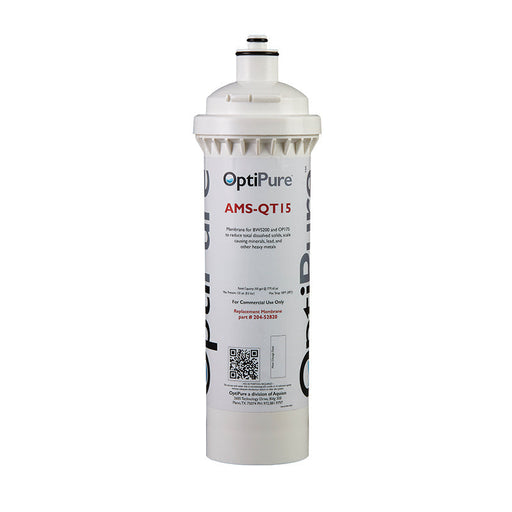Best Sellers
Everpure ESO7 EV9607-25 Espresso Filter Cartridge 1.0 GPM 5,300 Grains
The Everpure ESO 7 EV960725 Cartridge has a unique three-stage blending process to provide softened, buffered, filtered water for specialty coffee,...
View full detailsOptiPure 300-05828 CTO-Q10 Cartridge 1.5 GPM 0.5 Micron
The Pentair OptiPure CTO-Q10 is a 10” Qwik-Twist cartridge for use in OptiPure QT10 Series Systems to reduce sediment down to 0.5-microns and reduc...
View full detailsOptiPure 170-52081 QTI1+CR Cartridge Kit CTO-Q10 CTOS-QCR
The CTO-Q10 is a 10” Qwik-Twist cartridge that reduces sediment down to 0.5 microns and reduces chlorine, taste & odor at a flow rate of 1.5 GP...
View full detailsEverpure DEV9830-01 HQS-WF Filter Cartridge
Application: Produces perfect water for premium drinking water applications. Fits Everpure QL1 and QL3b heads. Part of a sanitary quick-change fil...
View full detailsOptiPure 204-52820 AMS-QT15 Reverse Osmosis RO Membrane
The AMS-QT15 is a 10″ Qwik-Twist replacement membrane for BWS200 and OP175 systems that reduces Total Dissolved Solids (TDS), scale-causing mineral...
View full detailsBest Sellers - Filtration Systems
Several key factors must be considered when choosing a water filtration system for foodservice. Here are some important aspects to look for:
- Water Quality Requirements: Assess your foodservice establishment's specific water quality needs. Consider factors such as the source of your water, any contaminants or impurities present, and the desired level of filtration required to meet industry standards.
- Filtration Technology: Different filtration technologies are available, including activated carbon filters, reverse osmosis systems, and ultraviolet (UV) disinfection. Determine which technology is most suitable for your establishment's water quality needs. For comprehensive filtration, a combination of different technologies may be necessary.
- Flow Rate and Capacity: Evaluate the flow rate and capacity requirements based on the size of your foodservice operation. Consider the volume of water needed during peak hours and select a filtration system that can handle that demand without compromising water quality.
- Maintenance and Replacement: Understand the maintenance requirements of the filtration system, including filter replacement schedules and the associated costs. Look for systems with easily accessible and replaceable filters to ensure convenience and cost-effectiveness.
- NSF Certification: Verify that the filtration system you choose is certified by the National Sanitation Foundation (NSF) or another reputable organization. NSF certification ensures that the system meets industry water quality and safety standards.
- Installation and Space Considerations: Determine if the filtration system requires professional installation or if your staff can easily set it up. Assess the available space in your foodservice establishment and choose a system that fits well within those constraints.
- Cost: Consider the initial cost of purchasing and installing the filtration system, as well as the ongoing expenses associated with maintenance, filter replacements, and energy consumption. Balance the upfront investment with long-term benefits and cost savings.
- Warranty and Support: Research the warranty coverage provided by the manufacturer and the availability of customer support. A reliable warranty and responsive support can give you peace of mind and ensure prompt assistance in case of any issues or malfunctions.
By evaluating these factors, you can select a water filtration system that meets your foodservice establishment's specific needs, ensuring high-quality water for food preparation, beverage service, and overall customer satisfaction.
A water filter system is a device or set of components designed to remove impurities, contaminants, and undesirable substances from water. It passes water through various filtration media or technologies to improve its quality, taste, and safety. Water filter systems are commonly used in homes, businesses, and other settings to provide clean and potable water for drinking, cooking, and other purposes.
Several water filter systems are available, each employing different filtration methods to target specific contaminants.
Here are some common types:
- Activated Carbon Filters: These filters use activated carbon, typically carbon blocks or granules, to adsorb and remove impurities like chlorine, volatile organic compounds (VOCs), and certain chemicals. They are effective in improving taste and odor.
- Reverse Osmosis (RO) Systems: RO systems utilize a semipermeable membrane to remove many contaminants, including bacteria, viruses, heavy metals, dissolved solids, and certain chemicals. RO systems are known for their high filtration efficiency but may require additional pre-filters and post-treatment to optimize performance.
- Ultraviolet (UV) Disinfection Systems: UV filters use ultraviolet light to neutralize or kill microorganisms like bacteria, viruses, and parasites. UV systems are often used in conjunction with other filtration methods to provide a comprehensive solution for microbial control.
- Ceramic Filters: These filters contain porous ceramic materials that trap sediments, bacteria, and other impurities while allowing clean water to pass through. They are commonly used in portable or gravity-fed systems for outdoor activities or emergencies.
- Ion Exchange Filters: Ion exchange filters use resin beads to remove dissolved minerals, such as calcium and magnesium ions, and replace them with sodium or potassium ions. These filters are effective in reducing water hardness.
- Distillation Systems: Distillation involves heating water to create steam, which is then condensed back into liquid form, leaving behind most impurities. Distillation systems can remove many contaminants, including heavy metals, bacteria, and chemicals.
The choice of water filter system depends on the user's specific needs and water quality concerns. It's important to consider factors such as the type and concentration of contaminants, flow rate requirements, maintenance, and cost when selecting the most suitable water filter system for a particular application.


